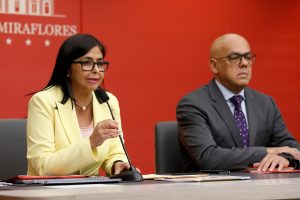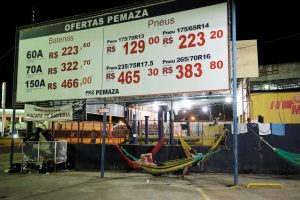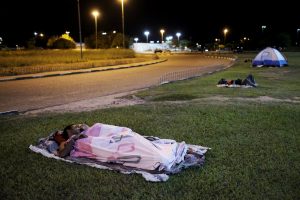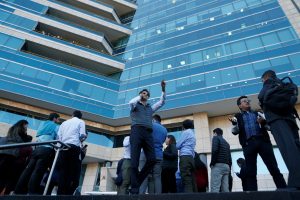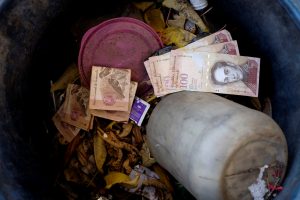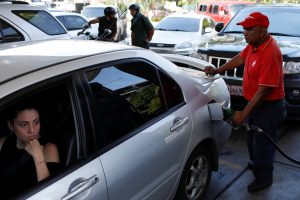
By Alexandra Ulmer
VILLA DEL ROSARIO, Colombia (Reuters) – Every few minutes, the reeds along the Tachira River rustle. Smugglers, in ever growing numbers, emerge with a ragtag group of Venezuelan migrants – men struggling under tattered suitcases, women hugging bundles in blankets and schoolchildren carrying backpacks. They step across rocks, wade into the muddy stream and cross illegally into Colombia.
This is the new migration from Venezuela.
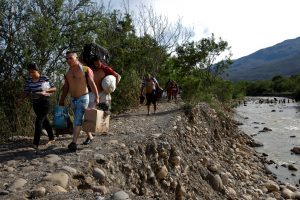
Venezuelans carry their belongings along a pathway after illegally entering Colombia through the Tachira river close to the Simon Bolivar International bridge in Villa del Rosario, Colombia August 25, 2018. REUTERS/Carlos Garcia Rawlins
For years, as conditions worsened in the Andean nation’s ongoing economic meltdown, hundreds of thousands of Venezuelans – those who could afford to – fled by airplane and bus to other countries far and near, remaking their lives as legal immigrants.
Now, hyperinflation, daily power cuts and worsening food shortages are prompting those with far fewer resources to flee, braving harsh geography, criminal handlers and increasingly restrictive immigration laws to try their luck just about anywhere.
In recent weeks, Reuters spoke with dozens of Venezuelan migrants traversing their country’s Western border to seek a better life in Colombia and beyond. Few had more than the equivalent of a handful of dollars with them.
“It was terrible, but I needed to cross,” said Dario Leal, 30, recounting his journey from the coastal state of Sucre, where he worked in a bakery that paid about $2 per month.
At the border, he paid smugglers nearly three times that to get across and then prepared, with about $3 left, to walk the 500 km (311 miles) to Bogota, Colombia’s capital. The smugglers, in turn, paid a fee to Colombian crime gangs who allow them to operate, according to police, locals and smugglers themselves.
As many as 1.9 million Venezuelans have emigrated since 2015, according to the United Nations. Combined with those who preceded them, a total of 2.6 million are believed to have left the oil-rich country. Ninety percent of recent departures, the U.N. says, remain in South America.
The exodus, one of the biggest mass migrations ever on the continent, is weighing on neighbors. Colombia, Ecuador and Peru, which once welcomed Venezuelan migrants, recently tightened entry requirements. Police now conduct raids to detain the undocumented.
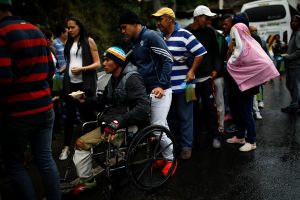
FILE PHOTO: Undocumented Venezuelans migrants stand in line to wait for food to be handed out by a group of Colombians, who fund an informal soup kitchen, outside a makeshift shelter in Pamplona, Colombia August 26, 2018. REUTERS/Carlos Garcia Rawlins
In early October, Carlos Holmes Trujillo, Colombia’s foreign minister, said as many as four million Venezuelans could be in the country by 2021, costing national coffers as much as $9 billion. “The magnitude of this challenge,” he said, “our country has never seen.”
In Brazil, which also borders Venezuela, the government deployed troops and financing to manage the crush and treat sick, hungry and pregnant migrants. In Ecuador and Peru, workers say that Venezuelan labor lowers wages and that criminals are hiding among honest migrants.
“There are too many of them,” said Antonio Mamani, a clothing vendor in Peru, who recently watched police fill a bus with undocumented Venezuelans near Lima.
“WE NEED TO GO”
By migrating illegally, migrants expose themselves to criminal networks who control prostitution, drug trafficking and other rackets. In August, Colombian investigators discovered 23 undocumented Venezuelans forced into prostitution and living in basements in the colonial city of Cartagena.
While most migrants are avoiding such straits, no shortage of other hardship awaits – from homelessness, to unemployment, to the cold reception many get as they sleep in public squares, peddle sweets and throng already overburdened hospitals.
Still, most press on, many on foot.
Some join compatriots in Brazil and Colombia. Others, having spent what money they had, are walking vast regions, like Colombia’s cold Andean passes and sweltering tropical lowlands, in treks toward distant capitals, like Quito or Lima.
Johana Narvaez, a 36-year-old mother of four, told Reuters her family left after business stalled at their small car repair shop in the rural state of Trujillo. Extra income she made selling food on the street withered because cash is scarce in a country where annual inflation, according to the opposition-led Congress, recently reached nearly 500,000 percent.
“We can’t stay here,” she told her husband, Jairo Sulbaran, in August, after they ran out of food and survived on corn patties provided by friends. “Even on foot, we must go.” Sulbaran begged and sold old tires until they could afford bus tickets to the border.
Venezuelan President Nicolas Maduro has chided migrants, warning of the hazards of migration and that emigres will end up “cleaning toilets.” He has even offered free flights back to some in a program called “Return to the Homeland,” which state television covers daily.
Most migration, however, remains in the other direction.
Until recently, Venezuelans could enter many South American countries with just their national identity cards. But some are toughening rules, requiring a passport or additional documentation.
Even a passport is elusive in Venezuela.
Paper shortages and a dysfunctional bureaucracy make the document nearly impossible to obtain, many migrants argue. Several told Reuters they waited two years in vain after applying, while a half-dozen others said they were asked for as much as $2000 in bribes by corrupt clerks to secure one.
Maduro’s government in July said it would restructure Venezuela’s passport agency to root out “bureaucracy and corruption.” The Information Ministry didn’t respond to a request for comment.
“VENEZUELA WILL END UP EMPTY”
Many of those crossing into Colombia pay “arrastradores,” or “draggers,” to smuggle them along hundreds of trails. Five of the smugglers, all young men, told Reuters business is booming.
“Venezuela will end up empty,” said Maikel, a 17-year-old Venezuelan smuggler, scratches across his face from traversing the bushy trails. Maikel, who declined to give his surname, said he lost count of how many migrants he has helped cross.
Colombia, too, struggles to count illegal entries. Before the government tightened restrictions earlier this year, Colombia issued “border cards” that let holders crisscross at will. Now, Colombia says it detects about 3,000 false border cards at entry points daily.
Despite tougher patrols along the porous, 2,200-km border, officials say it is impossible to secure outright. “It’s like trying to empty the ocean with a bucket,” said Mauricio Franco, a municipal official in charge of security in Cucuta, a nearby city.
And it’s not just a matter of rounding up undocumented travelers.
Powerful criminal groups, long in control of contraband commerce across the border, are now getting their cut of human traffic. Javier Barrera, a colonel in charge of police in Cucuta, said the Gulf Clan and Los Rastrojos, notorious syndicates that operate nationwide, are both involved.
During a recent Reuters visit to several illegal crossings, Venezuelans carried cardboard, limes and car batteries as barter instead of using the bolivar, their near-worthless currency.
Migrants pay as much as about $16 for the passage. Maikel, the arrastrador, said smugglers then pay gang operatives about $3 per migrant.
For his crossing, Leal, the baker, carried a torn backpack and small duffel bag. His 2015 Venezuelan ID shows a healthier and happier man – before Leal began skimping on breakfast and dinner because he couldn’t afford them.
He rested under a tree, but fretted about Colombian police. “I’m scared because the “migra” comes around,” he said, using the same term Mexican and Central American migrants use for border police in the United States.
It doesn’t get easier as migrants move on.
Even if relatives wired money, transfer agencies require a legally stamped passport to collect it. Bus companies are rejecting undocumented passengers to avoid fines for carrying them. A few companies risk it, but charge a premium of as much as 20 percent, according to several bus clerks near the border.
The Sulbaran family walked and hitched some 1200 km to the Andean town of Santiago, where they have relatives. The father toured garages, but found no work.
“People said no, others were scared,” said Narvaez, the mother. “Some Venezuelans come to Colombia to do bad things. They think we’re all like that.”
(Additional reporting by Mitra Taj in Lima, Anggy Polanco in Cucuta, Helen Murphy in Bogota and Alexandra Valencia in Quito. Editing by Paulo Prada.)





